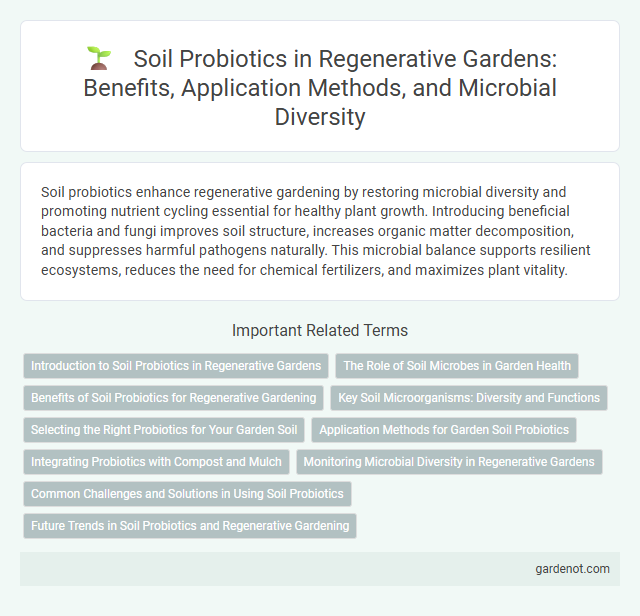Soil probiotics enhance regenerative gardening by restoring microbial diversity and promoting nutrient cycling essential for healthy plant growth. Introducing beneficial bacteria and fungi improves soil structure, increases organic matter decomposition, and suppresses harmful pathogens naturally. This microbial balance supports resilient ecosystems, reduces the need for chemical fertilizers, and maximizes plant vitality.
Introduction to Soil Probiotics in Regenerative Gardens
Soil probiotics in regenerative gardens consist of beneficial microorganisms that enhance nutrient cycling, improve soil structure, and increase plant resilience. These microbes, including bacteria, fungi, and actinomycetes, foster symbiotic relationships with plant roots, boosting growth and suppressing pathogens naturally. Integrating soil probiotics supports sustainable gardening by promoting long-term soil health and ecosystem balance.
The Role of Soil Microbes in Garden Health
Soil probiotics, composed of beneficial microbes like bacteria and fungi, play a crucial role in maintaining garden health by enhancing nutrient cycling and improving soil structure. These microbes promote plant growth by breaking down organic matter, releasing essential nutrients, and suppressing harmful pathogens. A thriving microbial community supports resilience against pests and diseases, leading to a more sustainable and productive regenerative garden ecosystem.
Benefits of Soil Probiotics for Regenerative Gardening
Soil probiotics enhance regenerative gardening by improving soil structure, increasing nutrient availability, and promoting beneficial microbial diversity essential for plant health. These microbes aid in decomposing organic matter, fixing nitrogen, and suppressing soil-borne pathogens, resulting in higher crop yields and resilient ecosystems. Integrating soil probiotics fosters sustainable growth while reducing the need for synthetic fertilizers and chemical pesticides.
Key Soil Microorganisms: Diversity and Functions
Key soil microorganisms in regenerative gardens include bacteria, fungi, and protozoa, which collectively enhance nutrient cycling and soil structure. Beneficial bacteria such as Rhizobium fix atmospheric nitrogen, while mycorrhizal fungi form symbiotic relationships with plant roots, improving water and nutrient uptake. Diverse microbial communities increase soil resilience against pathogens and support plant health by producing growth-promoting substances and decomposing organic matter.
Selecting the Right Probiotics for Your Garden Soil
Selecting the right soil probiotics involves identifying strains that enhance nutrient cycling, improve soil structure, and boost plant resilience, such as Bacillus subtilis and Trichoderma harzianum. Soil tests help determine microbial deficiencies, guiding the targeted application of probiotics to balance the soil microbiome effectively. Incorporating diverse probiotic blends tailored to specific soil types ensures optimal regeneration and sustained fertility in regenerative garden systems.
Application Methods for Garden Soil Probiotics
Applying garden soil probiotics effectively involves mixing powdered or liquid probiotics into the topsoil around plants to enhance microbial diversity and soil health. Incorporating probiotics through drip irrigation systems ensures even distribution and deeper root zone colonization, promoting nutrient uptake and disease resistance. Regular soil probiotic treatments combined with organic mulching improve soil structure and stimulate beneficial microbial activity essential for regenerative gardening.
Integrating Probiotics with Compost and Mulch
Integrating soil probiotics with compost and mulch enhances microbial diversity and accelerates organic matter decomposition, promoting nutrient-rich soil that supports robust plant growth. Probiotic strains such as Bacillus subtilis and Trichoderma spp. boost beneficial microbial populations, improving soil structure and disease resistance in regenerative gardens. This synergy optimizes nutrient cycling and moisture retention, fostering a sustainable ecosystem that reduces the need for synthetic fertilizers.
Monitoring Microbial Diversity in Regenerative Gardens
Soil probiotics play a crucial role in enhancing microbial diversity within regenerative gardens, promoting nutrient cycling and plant health. Monitoring microbial diversity involves using DNA sequencing and microbial biomass assays to assess the balance of beneficial bacteria, fungi, and other microorganisms vital for soil fertility. Consistent analysis helps optimize probiotic applications, ensuring resilient soil ecosystems that support sustainable crop growth.
Common Challenges and Solutions in Using Soil Probiotics
Soil probiotics face common challenges such as inconsistent microbial survival due to environmental stressors, limited compatibility with native soil microbiomes, and uneven application methods. Effective solutions include selecting resilient probiotic strains, customizing formulations to match specific soil conditions, and employing precise delivery techniques like seed coating or targeted soil inoculation. Integrating organic amendments and maintaining optimal soil moisture further supports the establishment and activity of beneficial microbes in regenerative gardens.
Future Trends in Soil Probiotics and Regenerative Gardening
Future trends in soil probiotics emphasize the integration of advanced microbial consortia to enhance soil health and plant resilience in regenerative gardening. Research is increasingly focusing on leveraging beneficial microbes like mycorrhizal fungi and nitrogen-fixing bacteria to boost nutrient cycling and carbon sequestration. Innovations in soil biotechnology promise to optimize microbial diversity, accelerating ecosystem restoration and sustainable agriculture.
Soil probiotic Infographic

 gardenot.com
gardenot.com